The Elements of Luck in Poker

Poker is a game of luck. Some players are unlucky and some are very lucky. However, the luck element diminishes as the number of hands increases. This is because the expected value of poker hands over a long period of time converges towards the normal bell-shaped curve. But, there are also some strategies that can increase the odds of winning.
Variations of poker
In addition to the standard poker game, there are a variety of variations available. These games vary in the number of players, playing requirements, and rules. For example, some variations of poker require two players, while others only require one. In most cases, the hand rankings in each variant are the same, but the actual game play differs slightly.
Texas Hold’em, for example, has become one of the most popular poker variants. Though it didn’t always become this popular, today it is the most common type of poker and is played by the majority of poker players. It is ideal for beginners as the rules are simple and easy to learn.
Betting intervals in poker
Betting intervals in poker are determined by the game’s rules and govern how much money players can raise at different times. The goal of every player is to maximize their chances of winning and minimize their losses during these intervals. Players make these decisions based on probability, psychology, and game theory. This article discusses the different types of betting intervals in poker and how they can affect your strategy.
Betting intervals in poker are periods in a hand when players may raise or fold their bets. The length of each betting interval may vary depending on the game rules and the number of players. When an interval is completed, the player with the highest chip total wins the pot. In general, betting intervals last from two seconds to seven minutes.
Limits of bets and raises in poker
Limits of bets and raises are the rules that govern the betting amounts in poker. These rules are the rules that govern the amount that a player can bet and raise per round, or street. Typical betting limits include the pot limit, no limit, fixed limit, and spread limit.
The limits of bets and raises vary among different types of games. For example, if you’re playing a game with a fixed limit of twenty dollars and forty dollars, each bet in the first two rounds is $20, while the big bet in the third and fourth rounds is $40. If your opponent raises, you must call. If you’re re-raised, you can raise again for $5. Otherwise, you’ll have to raise to ten dollars.
The luck element in poker
One of the most important elements in poker is luck. The best poker players are often able to exploit their luck to their advantage and win games. This element is also responsible for attracting new players into the game. As such, it is important to consider how to measure luck in poker. In this article, we’ll look at the various ways in which luck can be measured and what it means for poker players.
The luck element in poker is a very real factor in poker, but it varies according to several factors, including the number of players, the amount of hands dealt, and other variables. For example, poker players with good hands are more likely to win, while those with bad hands are more likely to lose. The luck factor is present in every hand, but it tends to diminish as the number of hands dealt increases. As such, the long-term expected value of a hand generally follows a bell-shaped curve.
Rules of the game
The Rules of Poker are a set of guidelines and rules pertaining to the game of poker. It is played using a standard pack of 52 playing cards. However, professional play uses two different color decks for faster play. Each player must post a blind bet of either $1 or $2 to start the game. Failure to post the blinds will result in a forfeit of the hand. There are two main types of poker: cash games and tournaments. Each type has its own set of rules.
The Rules of poker require that players be courteous and respectful to their opponents. Remember that you will be spending several hours with each person. Playing politely will help you extract monetary value from your opponents.